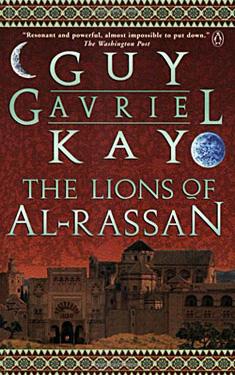Guy Gavriel
Kay
Completed 12/7/2019,
Reviewed 12/7/2019
5 stars
This was my
first book by Kay. At over five hundred
pages, it’s one of the longest books I’ve read in a long time. I was dreading it at first, but as I got past
the first fifty pages or so, I became enchanted by the prose. There are a lot of characters and city-states,
and there is a lot of politics. Usually I
lose my way in this type of book. But
the prose was so glorious that the reading of it became easy and I didn’t have
that hard of a time following the kings, the religions, the politics, and the
warring. It helped that I read some
reviews first so I didn’t go cold into the book. So I knew ahead of time that the setting is
an alternative Medieval Spain, conquered by a people like the Moors, with the
old Christian-like states pushed north, and a Jewish-like minority throughout.
 The setup is
fairly complex. The Asharites control
about three-quarters of the peninsula.
They are a desert people whose god is revealed through the stars and
their prophet Ashar. Once united as
Al-Rassan, the land has degraded down to a collection of city-states. Ammar ibn Khairan is an Asharite. He’s many things, including a poet, a kingly
advisor, and an assassin. The Jaddites
live in the north and some in the east.
Rodrigo Belmonte is a military captain of a band of mercenaries working
for one of the Jaddite kings. The
Kindath live throughout Al-Rassan, but are generally quartered in ghettos, and
are highly suspect by the Asharites. In
the Jaddite territories, they are often slaves.
Jehane bet Ishak is a doctor who treats all people. Through a series of unusual events, these
three characters end up exiled to one of the Jaddite kingdoms where they become
strong friends despite their religious differences in a world inching closer
and closer to a holy war.
The setup is
fairly complex. The Asharites control
about three-quarters of the peninsula.
They are a desert people whose god is revealed through the stars and
their prophet Ashar. Once united as
Al-Rassan, the land has degraded down to a collection of city-states. Ammar ibn Khairan is an Asharite. He’s many things, including a poet, a kingly
advisor, and an assassin. The Jaddites
live in the north and some in the east.
Rodrigo Belmonte is a military captain of a band of mercenaries working
for one of the Jaddite kings. The
Kindath live throughout Al-Rassan, but are generally quartered in ghettos, and
are highly suspect by the Asharites. In
the Jaddite territories, they are often slaves.
Jehane bet Ishak is a doctor who treats all people. Through a series of unusual events, these
three characters end up exiled to one of the Jaddite kingdoms where they become
strong friends despite their religious differences in a world inching closer
and closer to a holy war.
This book is
really about relationships between people and their similarities and differences
as a metaphor for how the world should get along. It is about love, honor, and respect in a
world with too little of these. The
complexity of the world and the relationships of these three main characters
simply took my breath away. There are
good guys and bad guys, but the point of view of the book is told from many
people from the three religions and the different city-states, leaving a lot of
moral ambiguity.
There are
many featured characters besides the three main ones. Some of their names were similar so that made
things a little hard to follow at times.
However, Kay makes sure to restate who people are which made it a little
easier to remember. They were all very
well developed. No one seemed like a
cardboard cutout.
My only
complaint about the book is that it’s considered fantasy. There are two moons and one of Rodrigo
Belmonte’s sons can see the future. But
that’s about it. It’s really alternate
history and it’s probably more appropriate to use the term speculative fiction
than fantasy. But that’s really a minor
point.
I give this
book five stars out of five. I was
completely absorbed in it. Everything about
the book, the plot, the prose, the characters, the world-building, all combine
to form one terrific novel. The ending
was quite a surprise and quite devastating.
This was one of those books where I had to chill after finishing. I really felt like had been immersed in a
different world, and coming out of it required a conscious transition. Kay has some retractors, but a lot of people
love him. I guess I’m now one of the
converted. At some point, I’ll have to
read Tigana, which is considered his best.
No comments:
Post a Comment